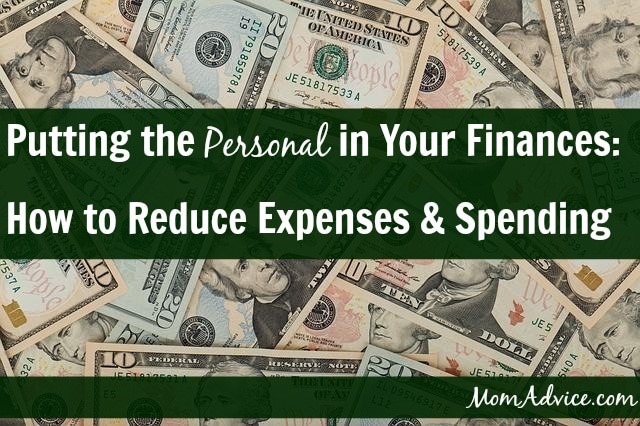From our money & finance contributor, Kelly Whalen.

Personal finance is called ‘personal’ for a reason. No matter what advice or best practices exist, money—how we earn, spend, and save it—is intertwined with our values, beliefs, and experience. By exploring not only the practical side but also the personal side, you will find that you not only can ‘find’ more money, but you’ll be happier because you’ve given your personal finances careful thought.
Knowing your goals and setting up a budget that works are the first steps in putting the personal in your finances. Once you know where your money is going and how much you’re spending you can challenge yourself and your family to reduce or eliminate unnecessary spending by examining what you’re spending through the filter of your goals.
Each expense should be evaluated and considered. Is it essential? Could it be reduced? Should we be ‘investing’ more in this area?
Let’s examine a few common areas where you may be able to find savings that can really add up:
Trivial Spending
Buying a cup of $3 coffee at work or spending $10 on lunch out with co-workers every week may not seem like a big deal, but it can add up…and fast! Spending $30/week on those little things can add up to over $1,500/year!
Tips to Manage Trivial Spending:
Choose intentional spending instead. If you know you are going to spend money on little thing it’s best to set a budget of yourself-or an allowance. Once you’ve spent your ‘allowance’ you will have to skip the little expenses for the rest of the month. This will allow you some freedom while staying within your budget.
Stop, Think, Spend Strategy
This simple strategy will keep you from overspending. Stop before you go to the checkout counter. Think about what you’re buying. Go over a few questions in your head to get yourself to be in the moment. No justifying the clearance cost or the unnecessary stuff.
Tips for using Spending Strategy:
Some sample questions you can either keep in mind or have a list in your wallet (ideally in front of your credit or debit card)
- Is it a need or want?
- Can you use something else in place of the item you’re going to purchase?
- Can you find a better price elsewhere?
Only after you’ve given it the stop and think then and only then is it time to spend.
Lists, Lists, and More Lists
One of the best strategies I have is to always shop with a list. I keep running lists on my phone and in a notebook I carry. This includes everything we need and things I’m looking out for-like a new pair of curtains and the budget I have for those items. If it’s not on the list we don’t purchase it. This keeps me from impulse purchases (my weakness!) and allows me to keep track of things we need that may not be at the forefront of my mind.
Tips for using Lists:
Use your phone or a dedicated notebook to keep track of your lists. There are plenty of apps that work great for this including Notes (on iPhone), Moleskine’s app, and Taasky.
Unwanted Expenses
We all have things in our budget we’d rather not spend money on-not the things we have to (like home repairs), but expenses that come from a lack of time management or organization. Some examples include; late fees, parking tickets, monthly contracts, or convenience fees. It could be you forgot to return your library books or you needed to pay a bill online that day and had to pay a $3.95/fee. You may have signed up for a ‘free’ trial and forgotten to cancel. While these may seem like small time they can add up if you aren’t careful.
Tips to Avoid Unwanted Expenses:
Avoid unwanted expenses when possible, but also make sure to have some room in your budget (Misc. category) for paying off those unwanted expenses now. To keep from making the same mistake again you can set reminders in your phone or have notes on your planner for due dates and mark down the day you should cancel a ‘free trail’.
Cutting the Cable(s)
One expense most families have is their cable bill. It can add up to more than $150 with internet access, cable channels, premium channels, DVRs, and a home phone. That’s a lot of dough! While internet access may be a requirement at home cutting the cable or dumping the home phone are both ways you can save big bucks.
Tips for Cutting the Cable:
Cutting the cable doesn’t mean never watching TV or movies! You can get a membership to Netflix, use Hulu, HuluPlus subscription, or Amazon’s Prime to stream movies and TV for cheap or free. The best part is you aren’t in a contract so you can cancel or ‘pause’ your membership at any time.
Reducing Interest Payments and Debt
The best way to reduce your expenses is to cut back on interest and debt payments. After all, saving more doesn’t make sense if you’re spending 10% or more on interest payments or more a large percentage of your earnings on debt. Debt isn’t all bad-it may allow you to pursue higher education, purchase your home, or finance a business. Revolving debt, loans, and high interest rates are an expense we should fight to eliminate.
Tips to Reduce Interest:
While you’re working to pay off debts you can reduce interest rates by:
- refinance your mortgage-you may be able to refinance for a lower interest rate
- call your credit card company-call your credit card company and ask for a lower interest rate
- switch credit card companies-0% intro rates are a great way to eliminate interest (be mindful of fees for transferring balances)
- consolidate loans-by consolidating loans into one payment you can often reduce interest rates
What are effective ways you’ve reduced expenses?
Pin It